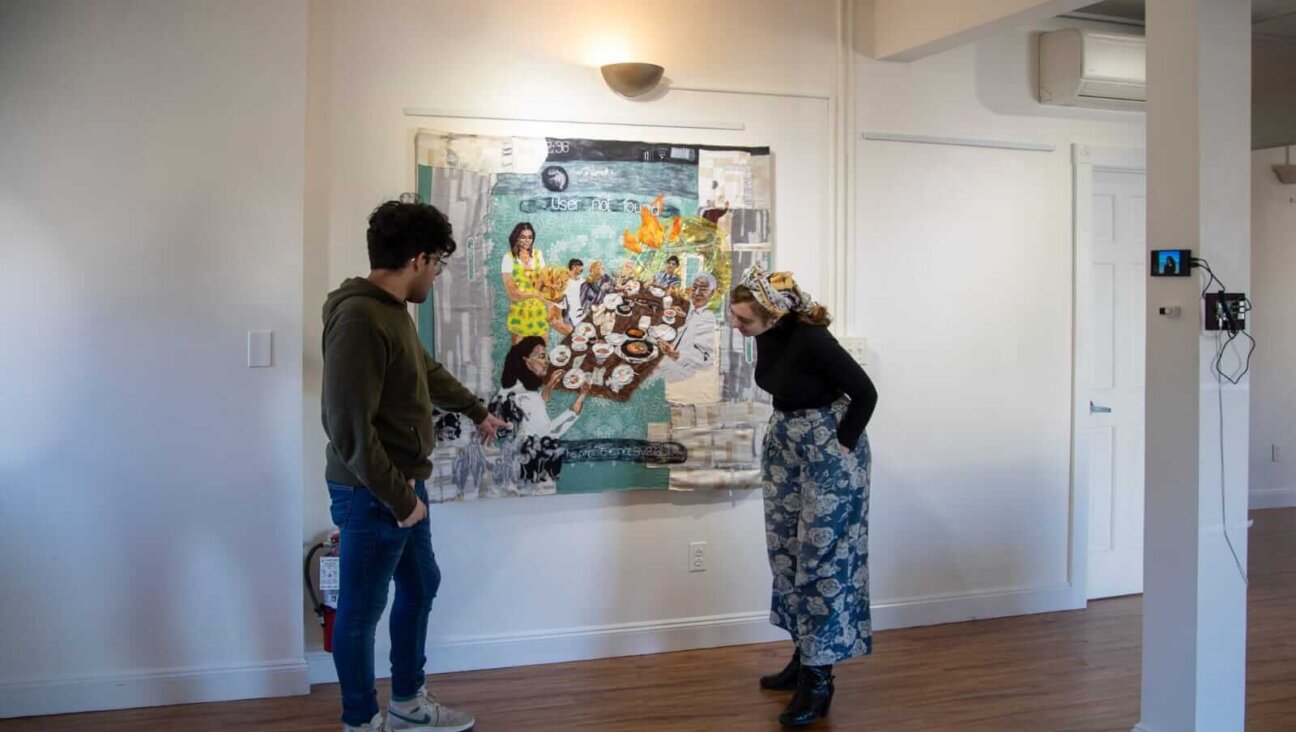Jewish Geography, the Maine Way

Graphic by Angelie Zaslavsky
Call it two degrees of separation. Jews with connections to the state of Maine journeyed in September to a lakefront home in Westchester County, N.Y. They came from around New York to meet and reminisce about this most northeasterly state.
The co-host of the gathering, Anne Schneider, said if someone did not find a lost cousin, she would be disappointed. Many found that they knew people in common. Schneider, for example, met the sister of a man she once dated.
A veritable Pine Tree State diaspora, the gathering was arranged by Documenting Maine Jewry, a project launched in 2004 under the nonprofit umbrella of the Jewish Community Alliance of Southern Maine in Portland. Its goal is to collect family histories, camp photos, cemetery records, synagogue memorial board lists, business brochures and oral histories that tell the story of Jews from this relatively low-population state and to put it all online. On its website, the group seeks “identification mavens” to help match names of people in old photos.
”Arbeiter
“The website is the beginning of a journey and repository for the next generation,” Schneider said.
This Westchester gathering of Maine Jews came on the heels of another such gathering in Maine in August. There, Bella Rolnick Cowan, 91, met the daughter of her former back door neighbor in Bangor. “She looked so much like her father that I could not believe it,” Cowan said.
Cowan mentioned that in the 1920s and ’30s, when her cousins from Brooklyn visited, they expected to see bears on her property. Still, she doesn’t think Maine Jews are exactly like their big-city counterparts. “We’re Yankees,” Cowan said. “We don’t talk like other Jews.”
A visiting professor at the University of Maine at Augusta and director of the Holocaust, Genocide and Human Rights Program, Abraham Peck, said that upon disembarking a plane, one might see a sign with a lobster that says, “Welcome to Maine.” “Right away,” he said, “it tells you it’s a treyf medina [non-kosher place].” He added, “If there were a ‘Welcome to New York’ sign, you’d probably see a knish.”
The key organizer of Documenting Maine Jewry is Harris Gleckman. After he volunteered to work on the records of the largest Jewish cemetery in southern Maine, word got out. “We are now governed by a minyan of 12 people,” said Gleckman, who prefers to be called the project shamus. The Maine Humanities Council, the Sam L. Cohen Foundation, and the Bernard Osher Foundation have lent monetary support. Etz Chaim synagogue in Portland has offered space. Documenting Maine Jewry is raising money to hire a part-time employee to organize the data and make it accessible.
Gleckman said research shows that about 1916 there were six Workmen’s Circle chapters in the state. None exists today. Maine also had a Jewish resort opposite the lake from Poland Spring House, at a time when the latter did not welcome Jews.
Indeed, not all of Maine Jewish history is uplifting. Cowan remembers as a young girl looking across the river into Brewer during Rosh Hashana, and seeing a wooden cross on fire. Peck noted the Ku Klux Klan had a strong presence in Maine during the 1920s. But, he said, Catholics caught more of their discriminatory feelings, which shielded the Jews from facing as much. Partly because of Klan influence, there were no Jews on the city council in Portland from 1923 to 1955.
At the Westchester gathering, Schneider and her husband, Howard, served drinks, including Moxie, a bitter-tasting soda favored in Maine. She said that in the early 1880s her great-great grandmother married a founder of the Jewish community in Portland who was the first president of an early synagogue there.
According to the American Jewish Year Book, the Jewish population of Maine has been estimated at 7,500 to 10,300 between the mid-1950s and 2005. Peck estimates that about three-quarters of Maine’s Jews reside in the southern part of the state. The heaviest concentrations of Jews are in Greater Portland, Bangor, Lewiston-Auburn, Augusta, Biddeford-Saco, Portland, Rockland, Bath and Waterville, each of which has a page on the website, www.MaineJews.org, and a local coordinator. Each city has its own coordinator for its web page.
Documenting Maine Jewry has 1,400 registered users to its website with access to information about 27,000 people with strong ties to Maine.
Visitors have access to an index of deceased Maine Jews and a portion of relevant historical documents. Registered users (registration is free) can see cemetery photos and individual files, and may edit individual documents online.
Peck, whose wife grew up in Portland and who calls himself a New Englander by adoption, said the Maine Jewish community, previously not particularly interested in its own history, has changed: “A sleeping giant has awakened.” He said in some ways Jewish life in Maine parallels Jewish life in Southern states such as Alabama: Neither has a New York-centric point of view.
“If you think ‘Lower East Side,’ you’ve got the wrong picture entirely,” said an assistant professor at Colby College, David Freidenreich, describing Jews in Maine. He has been conducting discussions around the state where Jews share their Maine stories.
Freidenreich said the earliest Maine Jewish resident about whom more is known than just a name is believed to be Susman Abrams, who died in 1850. His business records ran from right to left in Hebrew. He was mindful of his written prayers, yet also attended church services. He abstained from hard work on Saturdays, but enjoyed eating eel.
The website elaborates, “Jews have been living in Maine since the 1800s: There were fully functioning Jewish communities in Bangor in the 1840s, and in Portland in the 1880s.”
Cowan said she thought it was about time Maine’s Jewry is documented. She said Jews will be glad they looked into their family history in Maine. “They’ll never be sorry,” she said.”
Gary Shapiro is a freelance writer living in New York.
On November 14, from 2 to 5 p.m., there will be a gathering of Maine Jews from the Boston area at a home in Newton, Mass. Email [email protected] for more information.
On April 3, 2011, “Discovering Maine’s Jewish History: A Conference for Community, Professional, and Student Historians” will be held at Colby College in Waterville, Maine. Contact David Freidenreich at [email protected] for more information.















